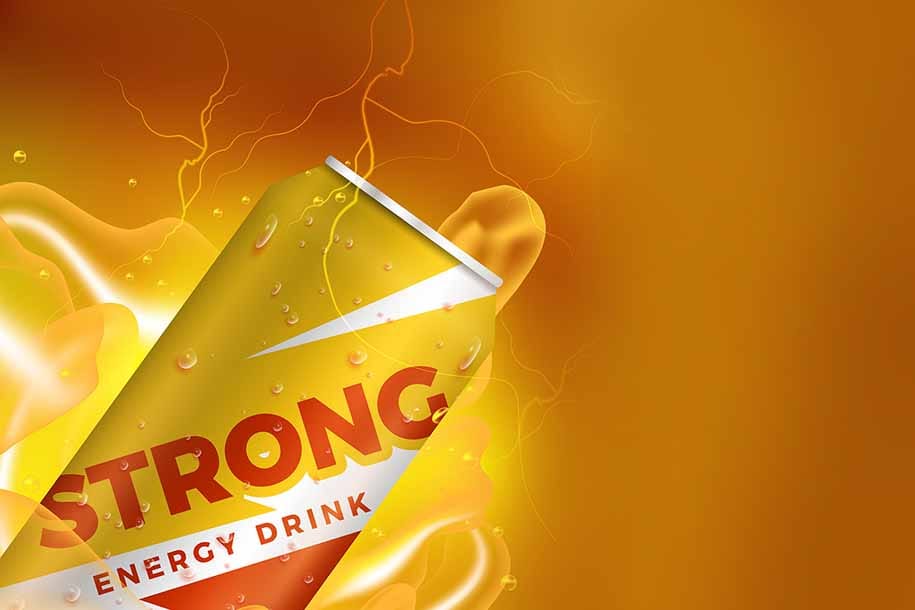Energy drinks have become an indispensable part of the shelves of supermarkets and gas stations. They are promoted as quick energy boosters, ideal for long days, intense sports performance or an all-nighter. The energy drink seems to have become a normal part of the soft drink offering. But should we consider it normal? Energy drinks can lead to anxiety disorders, especially in young people. It seems like something to be afraid of.
But what is actually in these drinks, and why are they increasingly linked to health risks?
What exactly are energy drinks?
Energy drinks are soft drinks designed to give you energy and increase your alertness. They are popular with young people, athletes, students and anyone who needs an extra boost.
De meeste energydranken bevatten een combinatie van stimulerende stoffen, waaronder:
- Cafeïne: Het belangrijkste actieve ingrediënt dat de hersenen stimuleert en vermoeidheid tijdelijk kan verminderen.
- Suiker: Een snelle bron van energie, vaak in hoge concentraties aanwezig.
- Taurine: Een aminozuur dat van nature in het lichaam voorkomt, maar waarvan de toegevoegde voordelen in energydranken niet wetenschappelijk bewezen zijn.
- Vitamines: Vaak B-vitamines die een rol spelen bij de energieproductie in het lichaam.
- Andere toevoegingen: Soms worden er kruidenextracten zoals ginseng of guarana toegevoegd.
The combination of these ingredients makes you feel temporarily more energetic. However, there is also a danger here, especially if you consume too many of these drinks.
Why is there often critical writing about energy drinks?
Although energy drinks seem harmless at first glance, there are increasing concerns about their health effects. They can lead to problems, especially if used excessively. Let's take a look at the main risks.
1. Excessive caffeine intake
The amount of caffeine in energy drinks is often higher than that in a standard cup of coffee. This can lead to complaints such as nervousness, a fast heart rate, sleep problems and even cardiac arrhythmias. For adults, the safe upper limit of caffeine intake is approximately 400 mg per day. However, a can of energy drink can already contain 80 to 160 mg. This is quickly too much for young people and children, who are more sensitive to caffeine.
2. High sugar content
Most energy drinks contain large amounts of sugar. A standard 250ml can can contain up to 27 grams of sugar – that's almost seven sugar cubes! This can contribute to obesity, type 2 diabetes and tooth decay. In addition, sugar provides a quick energy peak, but also a crash afterwards, which can make you more tired.
3. Addictive effect
The combination of caffeine and sugar can make energy drinks addictive. Your body gets used to the stimulating effect, so you need more to achieve the same effect. This can lead to a vicious cycle of excessive consumption.
4. Extra risky for young people
Energy drinks are especially popular among teenagers, but they are the ones most at risk. Their bodies are still developing and more sensitive to the effects of caffeine and sugar. Studies show that regular use of energy drinks in young people can lead to sleep problems, loss of concentration and even an increased risk of anxiety disorders.
5. Combination with alcohol
Mixing energy drinks with alcohol is a common trend, especially among young adults. This is dangerous because the stimulant effect of caffeine can mask the effects of alcohol. This makes you less aware of how drunk you actually are, which increases the risk of alcohol poisoning.
Are there safe alternatives?
Fortunately, if you need an energy boost, there are healthier alternatives than energy drinks. For example:
Water: Hydration is essential for energy.
Water, that sounds boring, but it isn't. Water zelf bevat geen stimulerende stoffen zoals cafeïne of suiker die een directe energieboost geven. Toch kan het drinken van voldoende water je wel indirect meer energie geven. Uitdroging, zelfs in milde vormen, kan namelijk leiden tot vermoeidheid, concentratieproblemen en een algemeen slap gevoel. Door gehydrateerd te blijven, help je je lichaam beter functioneren, wat je energieniveau op peil houdt.
So although water does not have the same effect as an energy drink, it does contribute to a stable and healthy energy level.
Healthy snacks: Eat a banana, nuts or a whole-grain cracker for a slow energy release.
Exercise: A short walk can increase your alertness without side effects.
Good sleep: Ultimately, getting enough sleep is the best way to maintain your energy.
Conclusion: go for the “boring” variant
Energy drinks are hip and happening and may seem like a quick solution for fatigue, but the risks certainly do not outweigh the benefits. It is strongly discouraged, especially for young people and people who already have health problems.
Go for the “boring variant”; Make sure you drink enough water, go to bed on time and exercise enough. Dat gezonde alternatief voor de energydrank is er dus zeker
Vergeet niet: echte energie komt van binnenuit, door een gezonde levensstijl en goede keuzes.
If you want to give your healthy lifestyle a little more incentive, then don't reach for the energy drink but sign up for een groepsles van bijvoorbeeld Muscle Mania of H.I.I,T.
At First Class Fitness, in addition to exercise specialists, there are also certified nutrition coaches. Register below for more information.

About Kitty Atsma
Kitty is a passionate nutrition specialist and vitality coach with a broad scientific basis in nutrition and exercise. As a member of the national examination committee of the TCI (Nutrition Specialist & GWC), she monitors the quality of the field at the highest level. As a professional blogger, Kitty combines her in-depth expertise with the possibilities of AI to make complex health topics accessible. She curates and controls the technology to get to the heart of the matter, where her own vision and years of practical experience always determine the course.
Nutrition Specialist Teacher | BGN Weight Consultant | Member TCI Examination Board | Vitality coach
